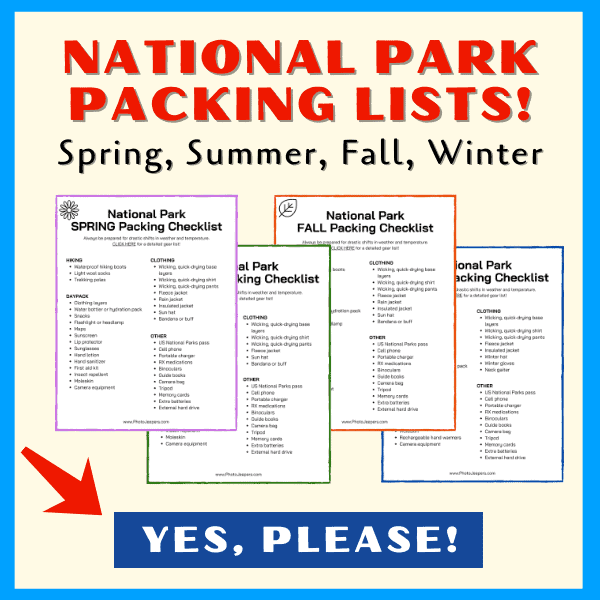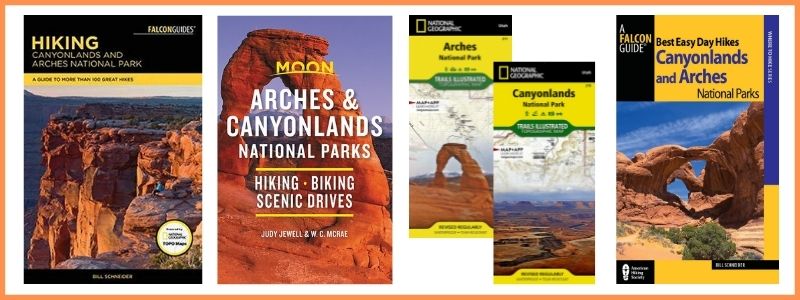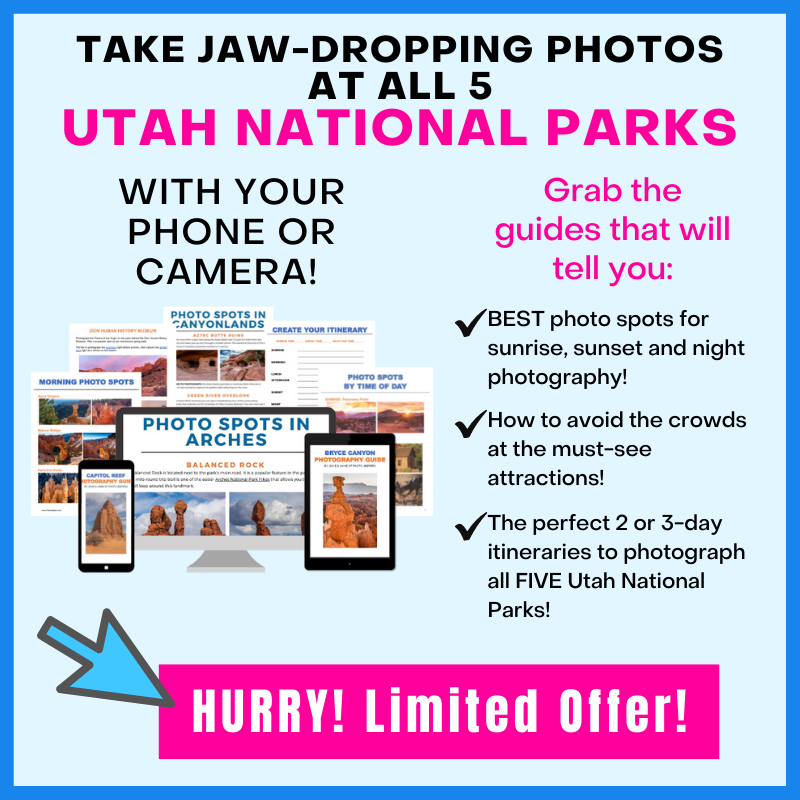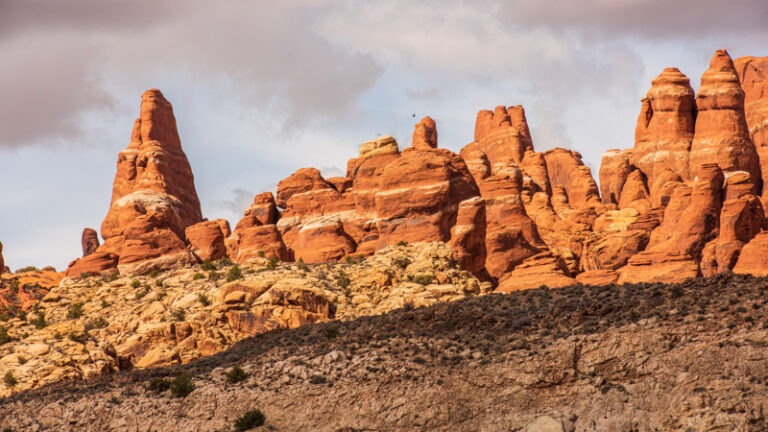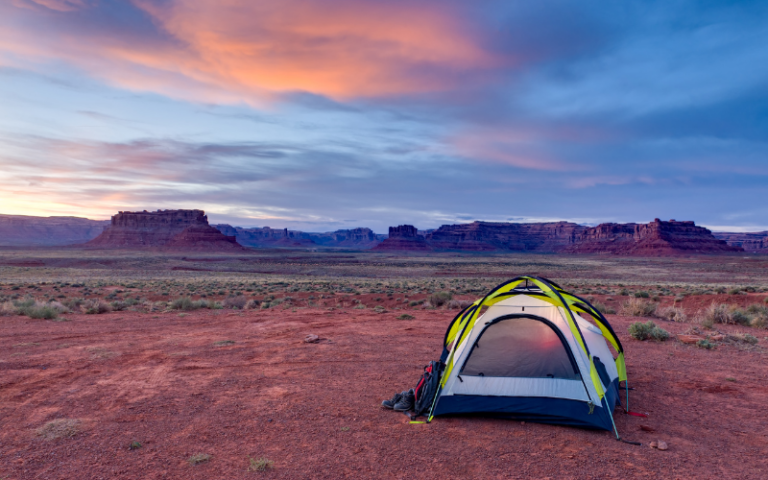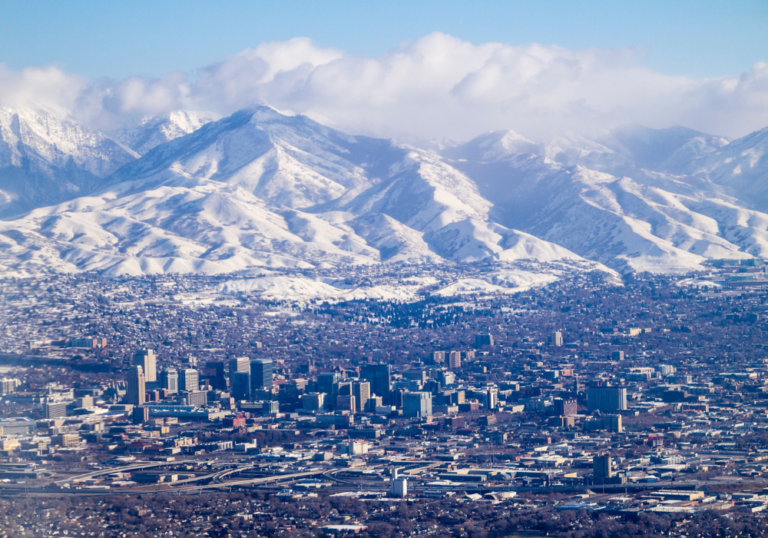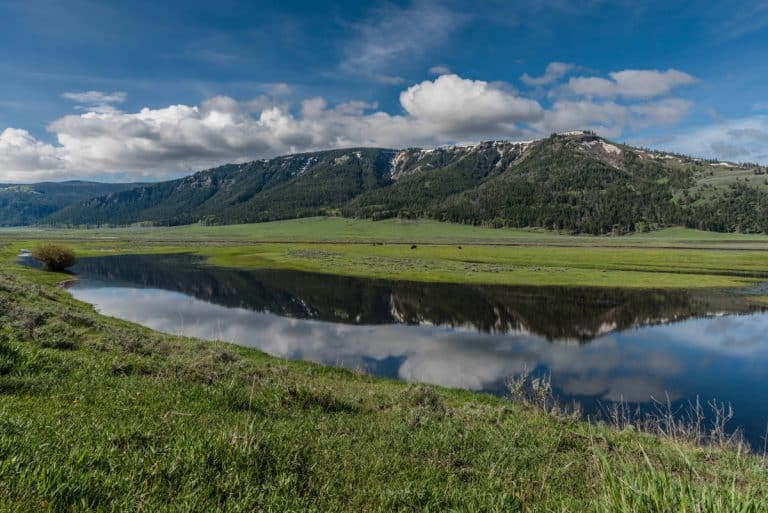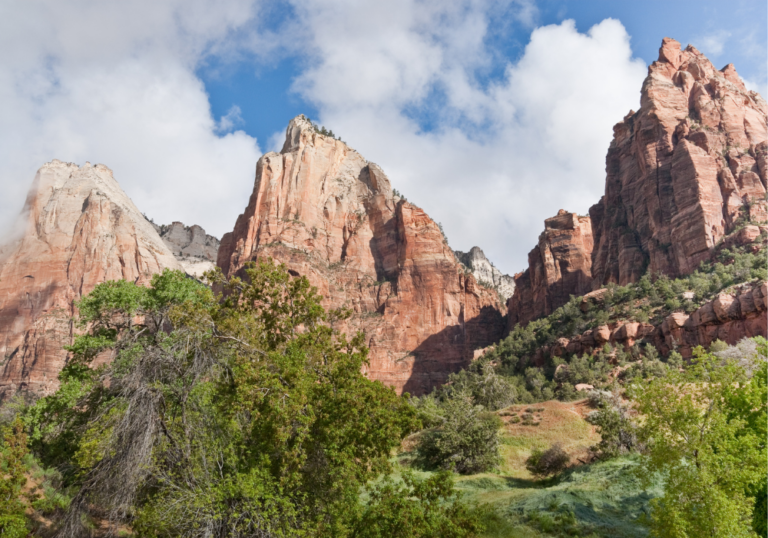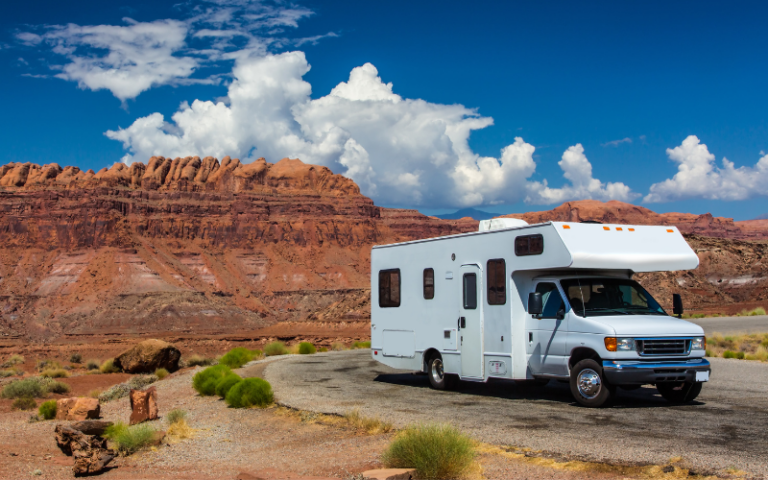Best Time to Visit Utah National Parks
Determining the best time to visit Utah National Parks depends on what you want to see and do.
As you’re looking at places to visit in Utah for an upcoming vacation, timing is one of the first things you need to decide.
Utah is one of the nation’s iconic outdoor states. Its beauty goes beyond what you see in postcards and curated photographs.
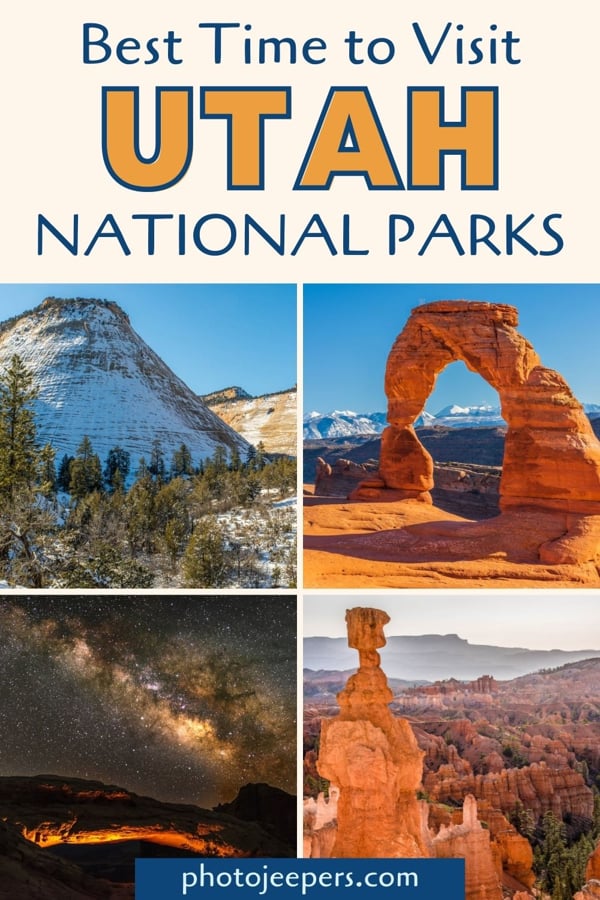
We’ve got everything you need to know to help you decide WHEN to visit the amazing national parks in Utah.
To help you plan an amazing vacation, check out our Utah National Park road trip itinerary!
This site contains affiliate links which means WE may receive commissions for purchases made through these links. We only provide links to products we actually use and/or wholeheartedly recommend! As an Amazon Associate, we earn from qualifying purchases. Read the full Disclosure Policy.
A Photo Tour of Utah National Parks
Take a visual tour through all five Utah National Parks to see the stunning landscapes you’ll see when you visit!
Best Time to Visit Utah National Parks
Visiting Utah National Parks is amazing ANY time of year, but there are pros and cons to visiting at various times and months of the year.
SPRING
- Utah National Parks in the Spring
- Utah National Parks in March
- Utah National Parks in April
- Utah National Parks in May
SUMMER
- Utah National Parks in the Summer
- Utah National Parks in June
- Utah National Parks in July
- Utah National Parks in August
FALL
- Utah National Parks in the Fall
- Utah National Parks in September
- Utah National Parks in October
- Utah National Parks in November
WINTER
- Utah National Parks in the Winter
- Utah National Parks in December
- Utah National Parks in January
- Utah National Parks in February
Here’s a list of the best times to visit the five parks in Utah:
- Best Time to Visit Arches National Park
- Best Time to Visit Bryce Canyon
- Best Time to Visit Canyonlands National Park
- Best Time to Visit Capitol Reef National Park
- Best Time to Visit Zion National Park
Utah National Parks Weather
It’s important to know the expected weather and temperatures for the parks during the time you’ll be taking your vacation!
- Arches National Park weather
- Bryce Canyon National Park weather
- Canyonlands National Park weather
- Capitol Reef National Park weather
- Zion National Park weather
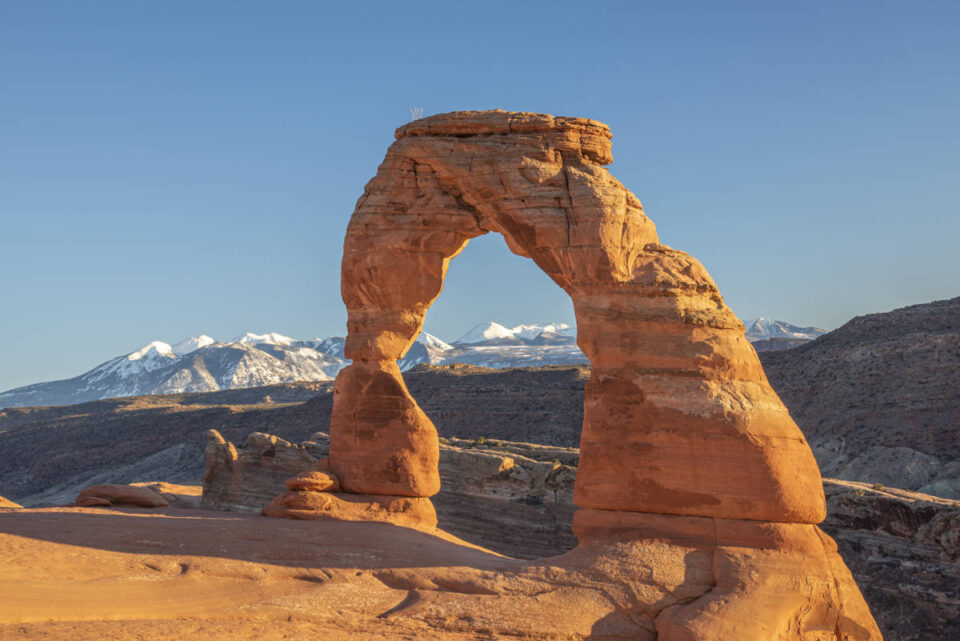
Utah National Parks in the Spring
Springtime is the most popular time for tourists to flock to Utah National Parks. The time between April to May is the busiest due to spring break in Utah and the mild temperatures.
If you want a more peaceful trip, then a spring trip may not be the right time for you.
Everything you need to know about a spring vacation to Utah National Parks!
- Arches National Park in the Spring
- Bryce Canyon National Park in the Spring
- Canyonlands National Park in the Spring
- Capitol Reef National Park in the Spring
- Zion National Park in the Spring
Spring Weather at Utah National Parks
Spring weather in Southern Utah means warmer days with cool nighttime temperatures, Be prepared for an occasional rainstorm, but the rain can produce some pop-up waterfalls which is a cool thing to see!
Due to the high elevation for Bryce Canyon, the temperatures will be much cooler than the other parks so be prepared with layers!
Arches
- March highs 64 / lows 35
- April highs 71 / lows 42
- May highs 82 / lows 51
Bryce Canyon
- March highs 45 / lows 23
- April highs 54 / lows 29
- May highs 64 / lows 37
Capitol Reef
- March highs 58 / lows 34
- April highs 65 / lows 39
- May highs 74 / lows 48
Canyonlands
- March highs 64 / lows 35
- April highs 71 / lows 42
- May highs 82 / lows 51
Zion
- March highs 66 / lows 39
- April highs 75 / lows 45
- May highs 86 / lows 54
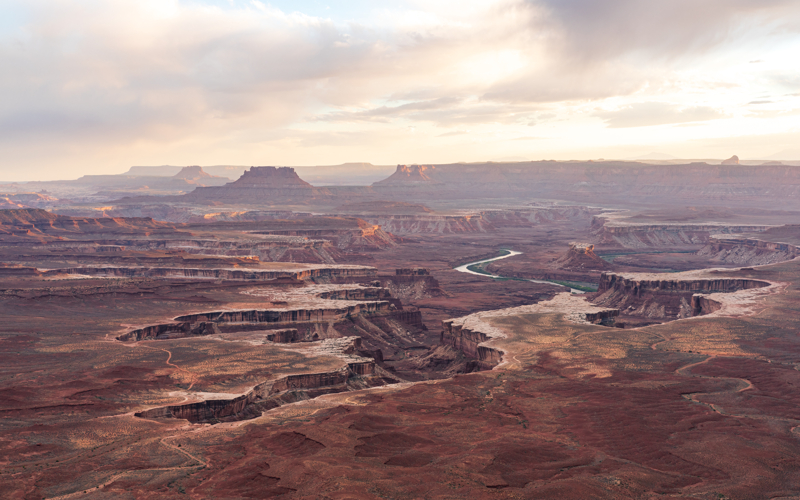
Utah National Parks in the Summer
Utah’s harsh and scorching summer weather means temperatures can rise over 100 degrees. If you want to visit Utah National Parks in the summer, here are a few tips.
Enter the park EARLY to enjoy the cooler morning air. Then during the heat of the day, go back to your hotel to swim or simply relax in the air conditioned room. Head back to the park late afternoon before sunset when the air begins to cool. And we always recommend you take an evening to look up and enjoy the night sky full of stars!!
Stay hydrated, eat salty snacks, use sun protection, and limit outdoor activity during the hottest part of the day during the summer months! If you’re not used to dry heat, you’ll want lotion and lip balm handy!
Everything you need to know about a summer vacation to Utah National Parks!
- Arches National Park Summer Vacation
- Bryce Canyon National Park in the Summer
- Canyonlands National Park in the Summer
- Capitol Reef National Park in the Summer
- Zion National Park in the Summer
Summer Weather
There’s no other way to say it… summer is sunny and hot! You’ll need to be prepared with sun protection, water. electrolytes, and salty snacks!
Arches
- June highs 93 / lows 60
- July highs 100 / lows 67
- August highs 97 / lows 66
Bryce Canyon
- June highs 75 / lows 45
- July highs 80 / lows 53
- August highs 77 / lows 50
Capitol Reef
- June highs 87 / lows 58
- July highs 91 / lows 65
- August highs 88 / lows 63
Canyonlands
- June highs 93 / lows 60
- July highs 100 / lows 67
- August highs 97 / lows 66
Zion
- June highs 95 / lows 63
- July highs 100 / lows 63
- August highs 99 / lows 68
During the summer monsoon season you’ll experience heavy rain and lightning. We recommend you talk to the rangers before hitting any trail to get the most updated conditions so you’re prepared!
Rain storms in the desert can create popup waterfalls that are so fun to see…. but do it safely!
Utah National Parks in the Fall
Fall is the next best season to visit Utah National Parks. The temperatures aren’t as hot as summer and you can enjoy some fall color on the leaves!
Because the weather is good for outdoor activities at the parks, expect crowds. Starting your day off early before the parks get crowded is always our number one tip!
Everything you need to know about Utah National Parks in the fall!
- Arches National Park in the Fall
- Bryce Canyon in the Fall
- Canyonlands National Park in the Fall
- Capitol Reef National Park in the Fall
- Zion National Park in the Fall
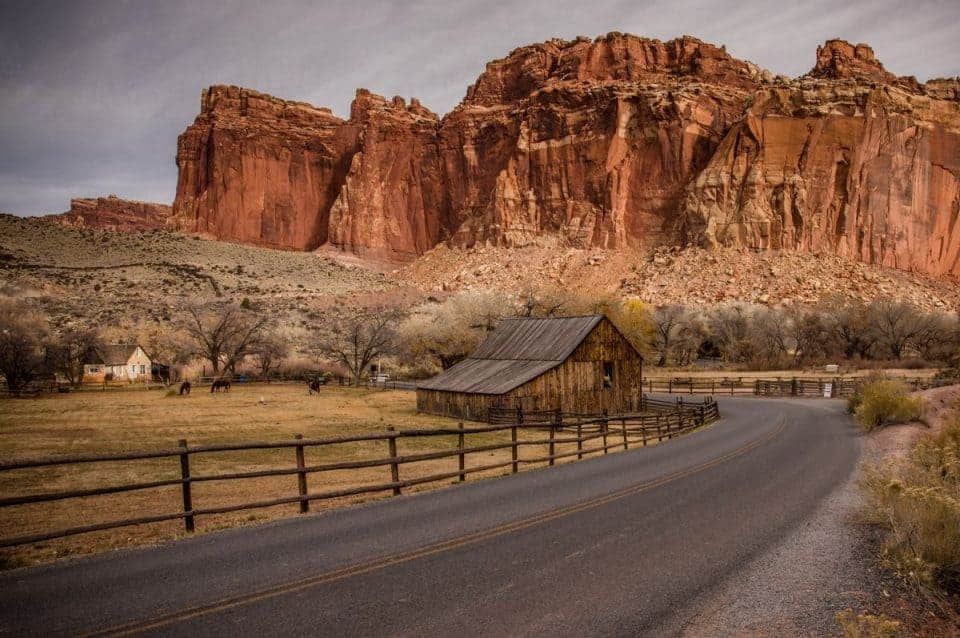
Fall Weather at Utah National Parks
The temperatures are starting to cool off in the fall months which makes is perfect for outdoor activities!
Arches
- September highs 88 / lows 55
- October highs 74 / lows 42
- November highs 56 / lows 30
Bryce Canyon
- September highs 70 / lows 42
- October highs 58 / lows 32
- November highs 45 / lows 23
Capitol Reef
- September highs 80 / lows 55
- October highs 66 / lows 43
- November highs 51 / lows 31
Canyonlands
- September highs 88 / lows 55
- October highs 74 / lows 42
- November highs 56 / lows 30
Zion
- September highs 91 / lows 61
- October highs 79 / lows 48
- November highs 64 / lows 37
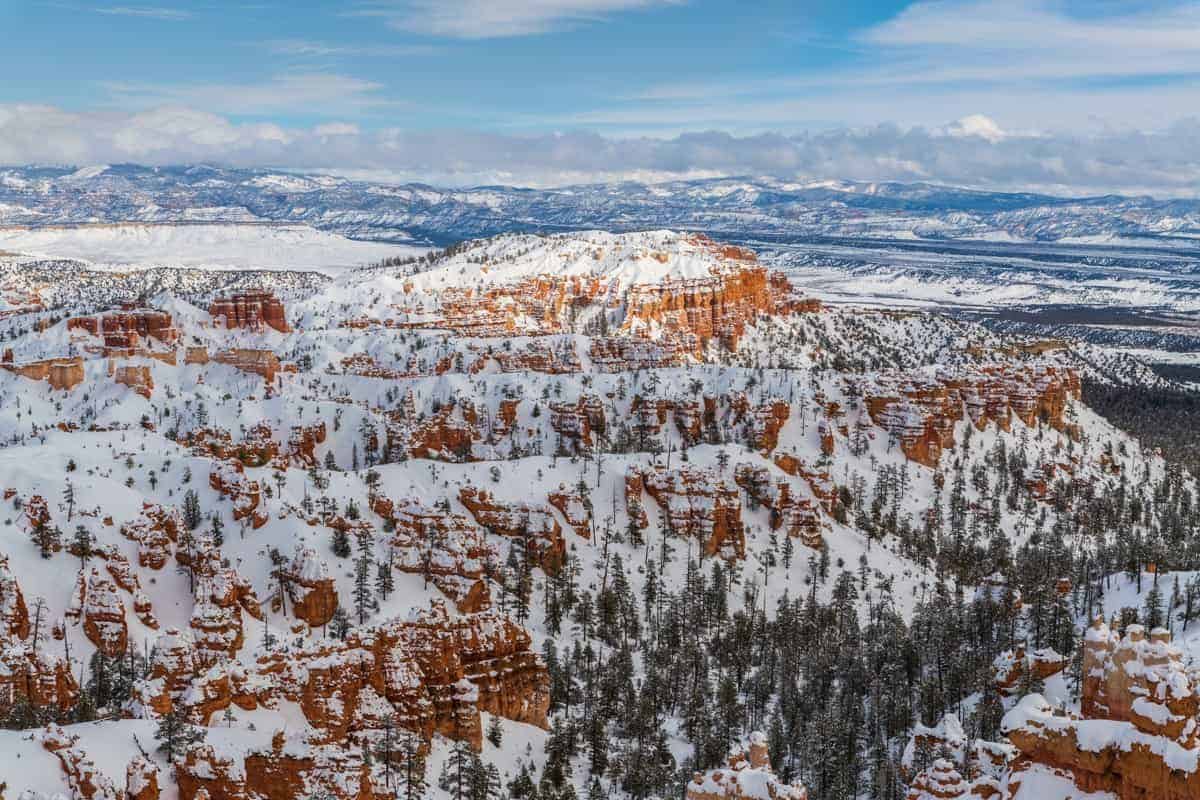
Utah National Parks in the Winter
Visiting Utah National Parks in the winter is our favorite time to go! It’s the off season so the prices for lodging are cheap compared to the spring, summer and fall.
We’ve found December to be the perfect time to go before the temperatures get really cold and the weather is bad with rain and snow.
Yes, winter may mean limited services and ranger programs, but if you want to enjoy hiking and taking pictures without the crowds then this is a great time to go!
Everything you need to know about a winter vacation to Utah National Parks!
- Arches National Park in the Winter
- Bryce Canyon in the Winter
- Canyonlands National Park in the Winter
- Capitol Reef National Park in the Winter
- Zion National Park in the Winter
Winter Weather at Utah National Parks
Be prepared with winter clothing: waterproof layers and shoes.
Before heading out to explore the park, check with the visitor center for updated conditions. During the winter hiking trails may close, or may require traction devices due to ice.
Arches
- December highs 45 / lows 23
- January highs 44 / lows 22
- February highs 52 / lows 28
Bryce Canyon
- December highs 36 / lows 15
- January highs 37 / lows 15
- February highs 38 / lows 17
Capitol Reef
- December highs 40 / lows 21
- January highs 41 / lows 20
- February highs 47 / lows 26
Canyonland
- December highs 45 / lows 23
- January highs 44 / lows 22
- February highs 52 / lows 28
Zion
- December highs 54 / lows 30
- January highs 54 / lows 30
- February high 59 / lows 34
BUY AT AMAZON: Arches and Canyonlands Guides and Maps

